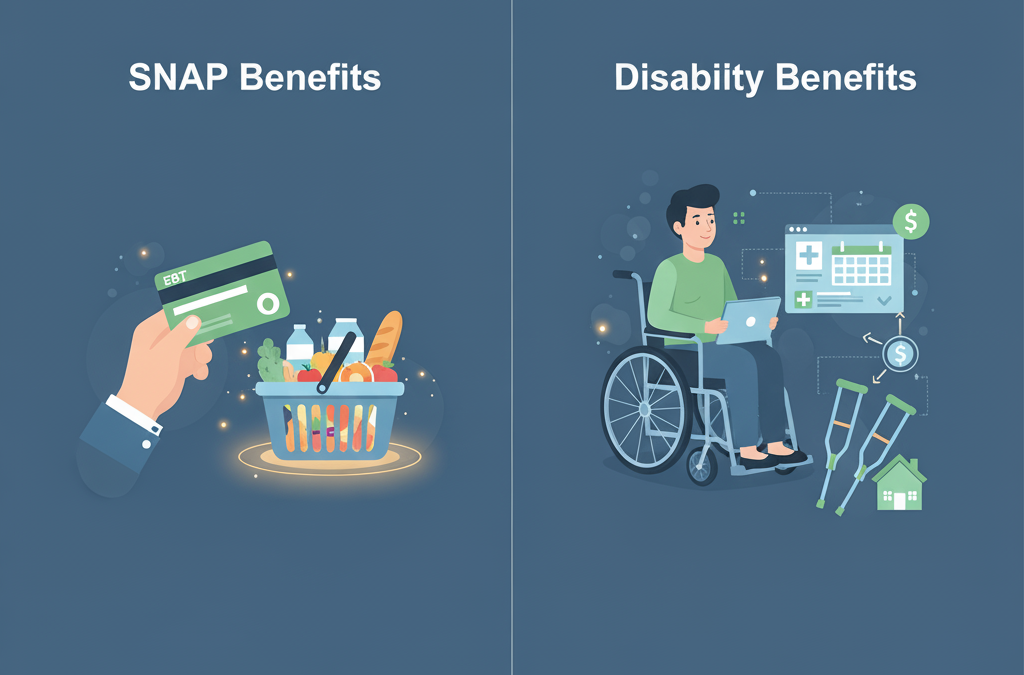In today’s economy, millions of Americans depend on government programs like SNAP (Supplemental Nutrition Assistance Program) and disability payments (SSI/SSDI) to make ends meet. These supports don’t just reduce poverty – they stabilize families, strengthen local economies, and, indirectly, shape the nation’s social and political landscape.
SNAP: A Lifeline for Working Families
The Supplemental Nutrition Assistance Program remains one of the most effective anti-hunger programs in the U.S.
- In FY 2024, about 12.3% of Americans received SNAP benefits.
- Roughly 79% of participating households included at least one child, elderly person, or an adult with a disability.
- Without this assistance, food insecurity would rise sharply – especially among people with disabilities, where the rate of food insecurity outside SNAP is 33.9%, compared with 10.5% for households without disabilities.
SNAP doesn’t just fight hunger – it fuels communities. Benefits are spent in local grocery stores and markets, generating business and jobs where they’re most needed.
Disability Payments: Dignity and Stability
For millions who cannot work full-time due to disability, SSI and SSDI provide essential income support.
- More than 7.4 million Americans currently receive SSI payments.
- The employment-population ratio for working-age adults with disabilities is just 37.4%, compared with over 75% for those without disabilities.
These payments prevent poverty, homelessness, and medical crises – ensuring that people who’ve worked, served, and contributed to society aren’t left without basic stability when health challenges arise.
A Cross-Partisan Reality
Contrary to stereotypes, reliance on food assistance or disability benefits isn’t confined to one political group.
- Surveys show that 31% of Democrats and 17% of Republicans say they or someone in their household has received SNAP benefits.
- About 45% of voters with disabilities identify as Republican, 39% as Democrat, and many others as Independent or politically moderate.
- A majority of Americans – across party lines – oppose cuts to SNAP and disability programs.
This underscores an important truth: these programs support Americans from every region, race, and political background. Hunger and disability don’t discriminate by ideology.
Why Businesses and Communities Should Care
When workers or community members face food insecurity or financial instability, the ripple effects are broad – from absenteeism to lower productivity and increased stress. Strengthening access to assistance programs isn’t just good policy; it’s good economics.
For businesses, nonprofits, and local leaders, this means:
- Recognizing that stability starts with security – including food and health access.
- Partnering with organizations to promote awareness of SNAP and disability benefits.
- Supporting employees and community members with inclusive benefits and flexibility.
The Bigger Picture
SNAP and disability benefits are sometimes portrayed as “handouts.” In reality, they are investments in human potential. They help parents feed their kids, individuals with disabilities live independently, and local businesses keep thriving.
As the data shows, these supports are not partisan issues – they’re pillars of a functioning, compassionate economy that benefits everyone.
In short: Programs like SNAP and SSI/SSDI aren’t about charity – they’re about stability, dignity, and the shared responsibility of a society that takes care of its own.

